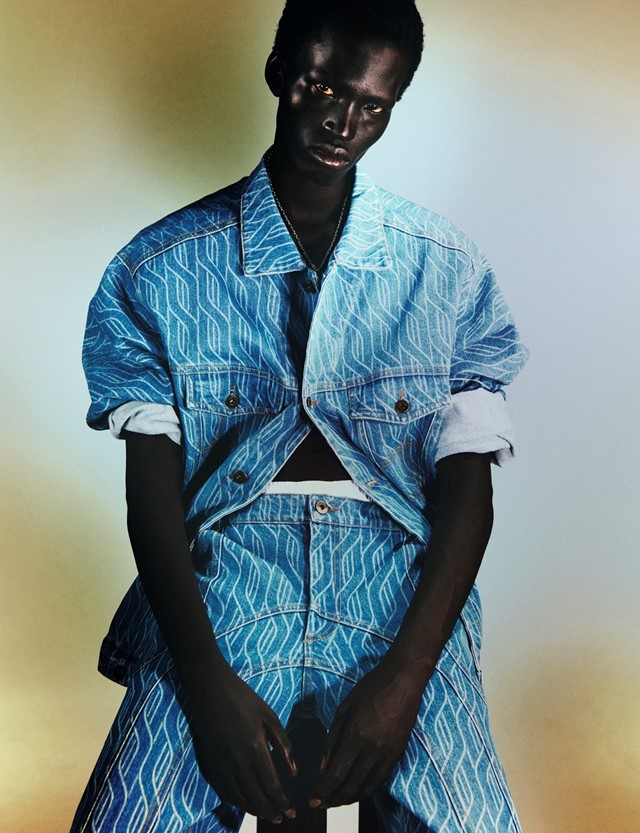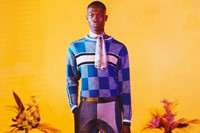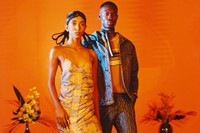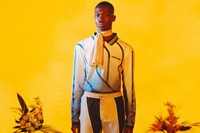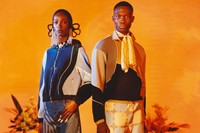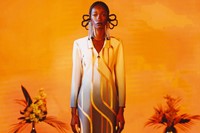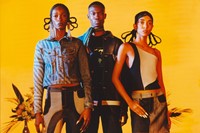In the new issue of AnOther Magazine, Priya Ahluwalia talks about falling in love with fashion film during the pandemic, why she expanded her brand into womenswear, and her favourite place in London
This article is taken from the Spring/Summer 2022 issue of AnOther Magazine:
Plans to meet Priya Ahluwalia at her London studio late last year were scuppered due to London’s escalating Covid-19 R rate. We wind up doing the interview via Zoom, so I ask her to describe what’s on her walls.
“I have huge mood boards. I always have the previous season and the current season that we’re working on,” she says. “There’s not that much space, but we’ve got big balls of fabric samples and textile technique experiments, lots of trinkets from my travels, plants, books ... ” She would like a bigger studio space, to help adapt to the increased-capacity needs of her design team and the ever-growing prominence of Ahluwalia, the label she founded in 2018. Another fixture of her studio? “All my awards,” Ahluwalia says proudly. Last year she won the BFC/GQ Designer Fashion Fund and the Queen Elizabeth II Award for British Design, and was named a Leader of Change for Environment at the Fashion Awards. She’s only 29.
The Ahluwalia label debuted as a menswear brand – “I feel like there’s so much left to be explored within menswear” – and quickly garnered praise for collections filled with vibrant colour, exuberant patterns, fusions of sportswear and tailoring, and signature patchworking.
Those designs bring together materials such as repurposed denim, nylon sliced from old tracksuits and knit panels from vintage sweater vests, a technique that is not only a statement on consumption, but also allows her to replicate the methods she has witnessed on trips to India and Nigeria, her countries of heritage. Expressing that heritage through design is far from an exact science – “It filters through in ways that are sometimes intentional and sometimes random” – but her exposure to those countries’ fashion economies has had an enduring impact on her brand. “When I’m in India, I’m constantly inspired by the intricate embroidery and textile techniques and how they vary from state to state. In Nigeria, I’ve visited incredible indigo dyeing houses.”
“Because I’m a dual-heritage woman of colour and I work sustainably, all of that can take up so much conversation” – Priya Ahluwalia
Her Spring/Summer 2022 collection is among her most ambitious – it includes the bags she collaborated on with Mulberry, which evoke the flamboyant styles of Lagos’s street fashion. “There’s a shade of burnt orange I use constantly – it reminds me of the colour of the sand in the streets,” she says. The clothes’ geometric waves and embroidery were inspired by the details and symbolism of African hair. This is her first joint men’s and women’s collection. Its influences range from photographer JD ’Okhai Ojeikere’s monumental documenting of Nigerian social and cultural life to vintage salon posters and the Nineties music videos of TLC, Aaliyah and Missy Elliott that she grew up watching on MTV Base. For the collection’s London Fashion Week presentation she collaborated with director Akinola Davies Jr to create the film Parts of Me, a meditation on the hairstyles of Black and South Asian women. It follows her shorts Joy, screened at GucciFest in 2020, and Traces, produced for her Autumn/Winter 2021 collection last year. It’s a change in direction she attributes to the pandemic. “I don’t know whether I would have done films if we were able to still do the runway – I’ve been able to fall in love with something I didn’t know I loved.”
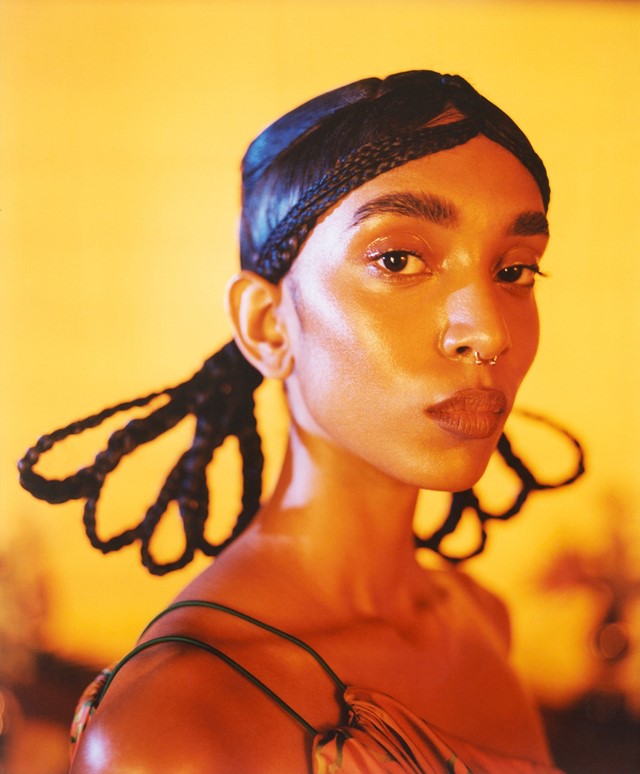
Ahluwalia’s early love for fashion was inspired by her mother, who raised her in southwest London. “She’s a really stylish woman, she liked shopping and feeling good. I’ve got loads of old pictures of her that come to mind a lot.” Ahluwalia has been experimenting with her own fashion as long as she can remember, recalling schooldays when she would customise her small Nike Just Do It bags and change her hairstyle every two weeks. “I used to wear very big, blinging bamboo earrings, always change my uniform and have my skirt too short.” The salons of Tooting Broadway were where she headed for her first excursions into glamour – and she continues to visit them today for nails, braids and eyebrow threading. “I love Tooting,” she says. “It’s got this one road that’s full of African and Caribbean businesses, and another which is very Indian focused. I can get everything I need. There’s a Congolese salon I go to. There’s a big sense of community.”
Given her interest in recycling, upcycling and regeneration in her reuse of fabrics, it’s understandable that her label is regularly described as sustainable. While the designer is undoubtedly committed to ecological integrity in her production, she finds the pigeon-hole categorisation limiting. “Because I’m a dual-heritage woman of colour and I work sustainably, all of that can take up so much conversation,” she says. “Our brand is really small and we’re trying to be as positive as we can.” Despite these frustrations she embraces being a leader of change and is particularly driven by a commitment to diversity and inclusion which she takes to the boardroom, too. When collaborating with Mulberry, she asked the brand to revise its diversity and inclusion policy to prevent hair discrimination. Entering Mulberry stores and seeing Black staff members with locs and braids – “They were so happy with it. Apparently they all went and got their hair done shortly after the announcement” – was one of her proudest moments.
Ahluwalia’s dual-heritage and sustainability practices are no distraction from the fact that: “actually I’m a good designer.” Her ambition is huge. “I can imagine that you could go into a house and have an Ahluwalia lampshade and bedspread. But I would also like to continue to try to be a thought leader and innovator in these spaces, to make a case that we can create and design beautiful things without destroying the planet.”
Hair: Christian Eberhard at Management Artists using ORIBE. Make-up: Christelle Cocquet at Calliste Agency. Models: Tanya Churbanova at Monster Management, Daria Koshkina at Ford Models, Olli Heinimäki at The Sisterhood, Eny Jaki at Oui Management, Mamuor Awak at Elite, Yura Nakano at Bananas and Yuki van Gog at Platform Agency. Casting: Daniel von der Graf and Andrea Prato. Set design: Sophear at Art and Commerce. Manicure: Anais Cordevant at Saint Germain. Digital tech: Lorenzo Touzet. Lighting director: Christian Bragg. Photographic assistant: Jonas Bjurman. Styling assistants: Nicola Neri, Valentine Jaquier and Alyssa Saim. Hair assistant: Giada Marina Giorgio. Make-up assistant: Aya Murai. Manicure assistant: Sueva Foltzer. Set-design assistants: Victor Leverrier and Alexis Mounoury. Production: Town Productions. Production assistants: Melissa Lartigue and Agathe Halin
This article appears in the Spring/Summer 2022 issue of AnOther Magazine, which is on sale here.
